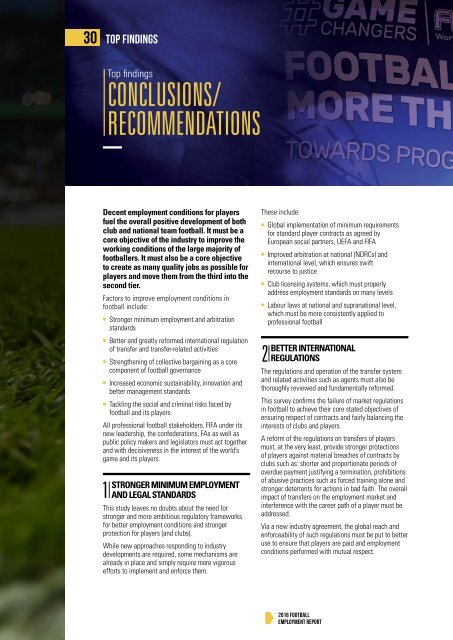2016 FIFPRO GLOBAL EMPLOYMENT REPORT
2016-fifpro-global-employment-report
2016-fifpro-global-employment-report
You also want an ePaper? Increase the reach of your titles
YUMPU automatically turns print PDFs into web optimized ePapers that Google loves.
30 TOP FINDINGS<br />
Top findings<br />
CONCLUSIONS/<br />
RECOMMENDATIONS<br />
Decent employment conditions for players<br />
fuel the overall positive development of both<br />
club and national team football. It must be a<br />
core objective of the industry to improve the<br />
working conditions of the large majority of<br />
footballers. It must also be a core objective<br />
to create as many quality jobs as possible for<br />
players and move them from the third into the<br />
second tier.<br />
Factors to improve employment conditions in<br />
football include:<br />
Stronger minimum employment and arbitration<br />
standards<br />
Better and greatly reformed international regulation<br />
of transfer and transfer-related activities<br />
Strengthening of collective bargaining as a core<br />
component of football governance<br />
Increased economic sustainability, innovation and<br />
better management standards<br />
Tackling the social and criminal risks faced by<br />
football and its players.<br />
All professional football stakeholders, FIFA under its<br />
new leadership, the confederations, FAs as well as<br />
public policy makers and legislators must act together<br />
and with decisiveness in the interest of the world’s<br />
game and its players.<br />
1<br />
STRONGER MINIMUM <strong>EMPLOYMENT</strong><br />
AND LEGAL STANDARDS<br />
This study leaves no doubts about the need for<br />
stronger and more ambitious regulatory frameworks<br />
for better employment conditions and stronger<br />
protection for players (and clubs).<br />
While new approaches responding to industry<br />
developments are required, some mechanisms are<br />
already in place and simply require more vigorous<br />
efforts to implement and enforce them.<br />
These include:<br />
2<br />
Global implementation of minimum requirements<br />
for standard player contracts as agreed by<br />
European social partners, UEFA and FIFA<br />
Improved arbitration at national (NDRCs) and<br />
international level, which ensures swift<br />
recourse to justice<br />
Club licensing systems, which must properly<br />
address employment standards on many levels<br />
Labour laws at national and supranational level,<br />
which must be more consistently applied to<br />
professional football<br />
BETTER INTERNATIONAL<br />
REGULATIONS<br />
The regulations and operation of the transfer system<br />
and related activities such as agents must also be<br />
thoroughly reviewed and fundamentally reformed.<br />
This survey confirms the failure of market regulations<br />
in football to achieve their core stated objectives of<br />
ensuring respect of contracts and fairly balancing the<br />
interests of clubs and players.<br />
A reform of the regulations on transfers of players<br />
must, at the very least, provide stronger protections<br />
of players against material breaches of contracts by<br />
clubs such as: shorter and proportionate periods of<br />
overdue payment justifying a termination, prohibitions<br />
of abusive practices such as forced training alone and<br />
stronger deterrents for actions in bad faith. The overall<br />
impact of transfers on the employment market and<br />
interference with the career path of a player must be<br />
addressed.<br />
Via a new industry agreement, the global reach and<br />
enforceability of such regulations must be put to better<br />
use to ensure that players are paid and employment<br />
conditions performed with mutual respect.<br />
<strong>2016</strong> Football<br />
Employment Report


